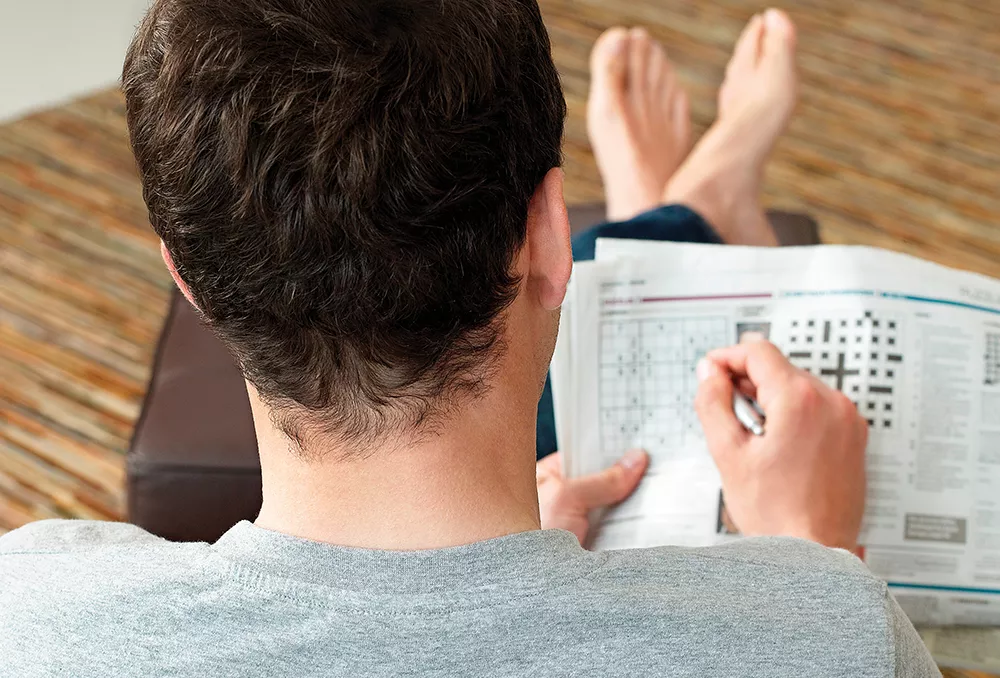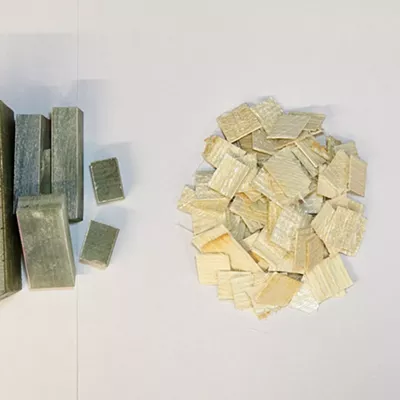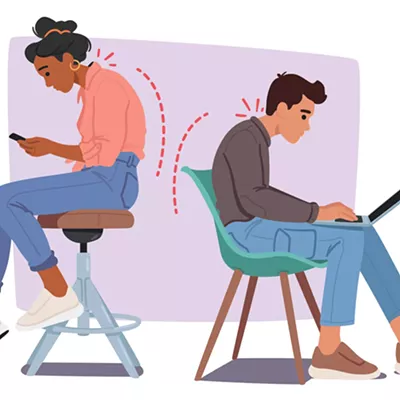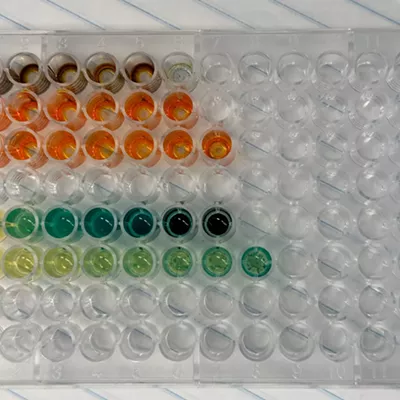You've probably heard something along the lines of "puzzles are good for your brain." Maybe you've heard that doing crosswords on a regular basis can help delay dementia. Maybe you've had a targeted ad try to sell you on a "brain training" app meant to keep you sharp by posing a series of complex puzzles and questions.
As it turns out, games and puzzles can be good for your brain, but what's truly good for your brain is doing something new.
Learning a new craft, trying out a new recipe, picking up a new instrument, taking a class on a subject you don't know about, exercising — all these things can be considered new or novel to your brain, which research is increasingly showing can help your brain function better, for longer.
It may even delay dementia and some cognitive disorders, although there is still no cure for diseases like Alzheimer's.
Exactly just how "doing new things" helps the brain still isn't fully understood by scientists, and there is no prescription for how long or how often you need to do new things to improve your brain health, explains Catherine Van Son, a nurse gerontologist who teaches students and faculty about nursing care for the aging at Washington State University, Vancouver.
"I really think it's a matter of everybody trying to find what will work for them, and trying something new and different," Van Son says. "It's not like if you do 10 crossword puzzles that's best, but if you do anything that's different or novel it will be helpful to you."
The range of novel things is huge. Van Son says it could even include driving a new route to get to work, brushing your teeth with your nondominant hand, or memorizing a new poem or religious verse.
"It may slow down the aging process," she says. "It won't necessarily eliminate it. It won't mean you won't get Alzheimer's, but it may be able to slow the process down, which is what a lot of the medications do, slow the progression down a little bit."
The key is to keep challenging yourself, and doing things where you’re learning along the way.
The key is to keep challenging yourself, and doing things where you're learning along the way, says Maureen Schmitter-Edgecombe, distinguished professor in the Department of Psychology at WSU, who has studied long-term aging and preventive care for about 25 years. In part, she works on methods to help people with cognitive difficulties so they may live more independently.
"What challenges you can change over time," she says. "For example, if you become an expert at doing sudoku or doing crosswords to where it's automatic and you can just answer, you need to up the ante, because you're not getting that new learning and problem-solving from that task anymore."
So doing a variety of different types of activities, from leisure, such as playing games or scrapbooking, to occupational, where you may be learning things on the job, can help, Schmitter-Edgecombe says. And while there's no prescription, she notes that some studies show being engaged in a novel activity for at least 20 minutes is important.
"We always encourage people to find activities they enjoy so they'll stick with them," she says.
Learning Through Games
Games aren't just good for free time. The emerging school of thought is that they can also help students learn and retain information better than typical lecture-style classes.
That's why over the last four or five years, many of the WSU Health Sciences departments in Spokane have started shifting to "active-learning" class sessions, where students get their learning materials before class so in-class time can be spent engaged with the instructor and other students, explains Boris Zhang, academic fellow at the WSU pharmacy school, where he graduated last May.
"My main job here is to see if I can find new innovative ways to engage with students here," Zhang says. "Lately we've been trying to move away from Jeopardy and other games that have been developed online because that's usually pretty dry at this time."
With most students around the millennial and Gen Z age range, the focus has gone more digital, again, trying to avoid things that have been overdone, Zhang says.
So to help professors keep things fresh, Zhang is working on tools like a "choose your own adventure"-style PowerPoint he's developing this semester for a pharmacy law class. With a handy background as someone who used to play a lot of Dungeons and Dragons, Zhang says he's writing a narrative-style quest for the students, where they have to solve puzzles and riddles, clicking through to the next slides to get the information they'll need later for a test.
"It's an activity where if you don't participate in it, you don't get anything out of it. Whereas if you look at Jeopardy, if you have all the slides with the answers, you don't have to participate," he says. "I put it in a game so you're more engaged, and maybe that might trigger something to help you remember a fact on the test."
Game Maker
Behind every puzzle you love, there's a puzzle maker.
With the internet enabling a boom in self-publishing, Wisconsin-based author Tamara L. Adams says she got into puzzle making several years ago. At the time, she'd been writing romance novels on the side and self-publishing when not busy with her career as a scientist.
That's when she noticed a lack of adult activity books like those that are common for kids. So she started making her own, with snarky titles such as F*** I'm Bored!
"All the phrases in there usually have some kind of cuss word or something a little naughty," Adams says.
Other activity books she's made are a little more family-friendly in nature, but the important thing for Adams was that the activity-based books took off compared to her novels. In fact, it's her full-time gig now, with Adams putting out 25 new titles in 2019 alone.
"I don't know how many books I have now, I just kind of have fun with it," she says. "I come up with a book idea, and if it sells, great."
One thing you won't find in her books are crosswords.
"My passion for puzzles started with my dad, he used to get Games magazine," Adams says. "It's full of puzzles, and they're really hard. I'd try to do all the puzzles from a young age, so I love puzzles of all kinds. Except crosswords, I don't like crosswords."
Instead, she's a fan of things like letter tiles, where users have to figure out the placement of boxes full of letters in order to make a phrase. Her works often include other activities such as word searches, dot-to-dot drawings, and number-related puzzles such as sudoku.
Aside from the challenge of the puzzles in Games magazine, Adams says that when she's not busy making her own puzzles, she'll sometimes play games on her phone, and when it comes to board games, her family is fond of Settlers of Catan.
"Because if you're into board games who doesn't like that?" she says.
The Marmot & Scooter Light Footbridge Problem
Alright logic-loving Inlanders, enjoy this Spokane-themed version of the bridge and torch problem.
You and your pal have just finished showing your grandparents the new Pavilion lights in Riverfront Park when you spot them: a band of rabid marmots headed your way! Don't ask how, but you figure out it'll take the randomly roving rodents 17 minutes to reach you. There's a hanging footbridge ahead that you can all cross and then cut down to prevent the marmots from following, but there's an issue: this tiny bridge can only support two of you at a time. It's dark and you all killed your phones taking video of the light show. You realize a nearby Lime scooter can light your way, but you cannot ride it. You can make it across the bridge in 1 minute, your friend can make it across in 2 minutes, but your grandma needs 7 minutes to get to the other side, while your grandpa needs a full 10 minutes. Only two may be on the bridge at a time, those on the bridge have to walk together because everyone needs the light of the scooter to cross the span in either direction, and everyone must make it to safety in the 17 minutes. How can you get everyone across? Answer below.
WSU's Neuropsychology and Aging Laboratory is often looking for research participants for studies focused on developing technologies and methods to help healthy aging adults and people with cognitive difficulties so they can function independently and maintain a high quality of life. The lab can be reached at 509-335-4033 for more information.
Marmot and Scooter Light footBridge Problem ANSWER:
You and your pal run across the bridge with the light first (2 minutes). Your friend stays on the safe side while you return to the other side to pass the light to your grandparents (1 minute), who will walk together (10 minutes). Your pal then runs the light back to you (2 minutes) and you cross together to safety (2 minutes) and cut the bridge just in time (total: 17 minutes) to avoid those fluffy but ferocious rodents.



























